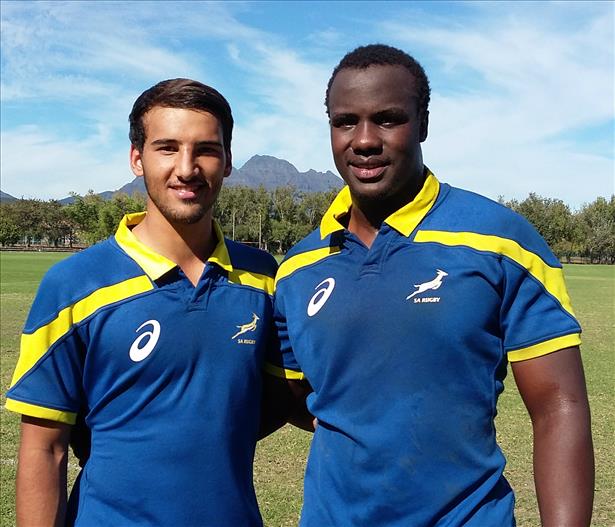
Scrumhalf Rewan Kruger, left, and prop Kwenzo Blose, both
rugby players from the University of the Free State, will
soon be playing in their first and second Junior World
Tournament respectively.
Photo: SA Rugby
Although he will soon be playing in his first Junior World Cup, Rewan Kruger believes his experience of international rugby will help him succeed. Last year, the scrumhalf was part of the South African schools team playing in the U19 series against Italy, Wales, England, and France.
Kruger and prop Kwenzo Blose, who will be playing in his second World Tournament, are two players from the University of the Free State that were recently included in the final Baby Boks group of 28. The World Rugby U20 Championship will take place in Tbilisi, Georgia from 31 May to 18 June.
A taste of international rugby
The 19-year-old Kruger says it is hard to describe how thrilled he is about his inclusion. “The whole group of players were gathered in a room and the next moment the coach [Chean Roux] played a video on his computer, announcing the team that will be playing abroad.”
The former Grey College, Bloemfontein, pupil has already had a taste of international rugby. “I believe the experience I gained in the international U19 series will help me a lot in the upcoming U20 World Rugby Championship. I already have an idea of the pace of an international game.”
Team can improve on previous year
Blose, KovsieSport’s Junior Sportsman for 2016, says the South African U20 team could do better than the fourth place they got in Manchester, England in 2016. “South Africa is a strong rugby nation and we have set high standards for ourselves. Therefore, we will do our best to win the tournament. We have a great group and I believe we have the potential to win the trophy.”
The former lock from Glenwood High School, Durban, says it has helped his team to play practice matches against senior teams such as the Griquas. “The preparation was tough and I think it will benefit the team.”